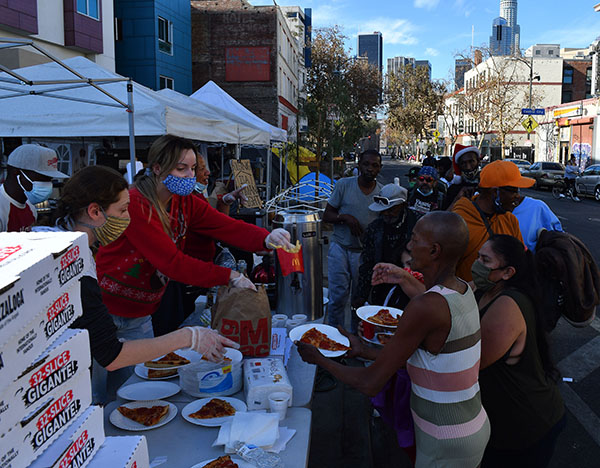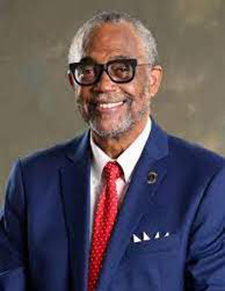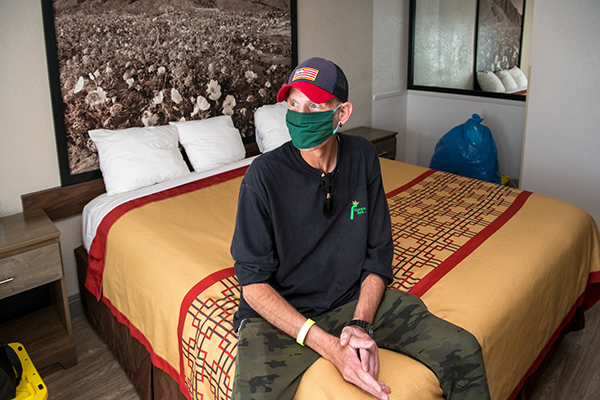As ICE raids escalate, Black Angelenos debate solidarity with Latino immigrants

LOS ANGELES — As many as 30,000 protesters — predominantly Latino — descended on downtown June 14 for the No King’s Day protest, waving Mexican flags and chanting, “ICE out of L.A.”
Helicopters hovered overhead. Vendors sold hot dogs. Nipsey Hussle and YG’s protest anthem “FDT” blared as the crowd sang along. Law enforcement dressed in riot gear stood watch.
Cresencio Hernandez, a Compton resident, said the protest — aimed at President Donald Trump’s planned military parade in Washington, D.C. the same day, coupled with recent immigration raids — felt like a direct invasion.
“ICE is terrifying our neighborhoods,” he said. “We don’t have kings. Our elected officials are supposed to listen to us. People don’t feel heard.”
President Trump said he deployed the National Guard and U.S. Marines to “liberate” Los Angeles from what he called violent unrest tied to immigration protests. Days later, at the G7 summit in Alberta, Canada, he urged immigration enforcement agents to focus on “sanctuary cities” and accused Democrats of using immigrants to grow the “welfare state.”
Only a handful of Black attendees stood out amid a sea of red, white and green — the colors of the Mexican flag.
But many Black leaders think the immigration raids impact Blacks as well as Latinos and that solidarity between Blacks and Latinos is essential at this time.
“Deploying Marines into neighborhoods is dangerous,” said Assemblyman Isaac Bryan, D-Culver City, who represents a majority-Black and Latino district. “We’re watching the government militarize our communities, separate families, and criminalize entire populations. We must reject this.”
Bryan said Immigration and Customs Enforcement agents had detained more than two dozen people in his district — many with no criminal records.
“These aren’t violent offenders,” he said. “These are fathers taken from car washes, mothers pulled from clinics. Children left without caregivers.”
He recalled a girl whose father was taken by ICE the day before her graduation.
“As someone adopted after being separated from my own parents, I feel deeply for these children,” he said.
“This isn’t just a Latino issue,” Bryan added. “Black families are being hit too. ICE has been active along Crenshaw [Boulevard] and other Black corridors — not just Boyle Heights or Pico Union.”
Black Lives Matter–Los Angeles co-founder Melina Abdullah agrees.
“This is absolutely our fight — morally and strategically,” she said. “Our ancestors endured family separation during slavery. How can we see this happen to others and say nothing?”
Abdullah, a professor at Cal State Los Angeles, draws a direct line between immigration raids and Black oppression.
“ICE is part of the police state,” she said. “The same system that over-polices Black communities is now targeting immigrants. If we don’t resist, those tools will be turned back on us.”
While Bryan acknowledged that solidarity has sometimes fractured, he pointed to shared moments of resistance: the George Floyd protests, the grassroots campaign to unseat Councilman Kevin de León after his racist remarks, and cultural expressions of unity.
“Tupac said it wouldn’t be L.A. without Mexicans. Nipsey and YG echoed that,” he said. “That solidarity is in our DNA. We just have to live it.”
Hernandez said he’s seen both support and hesitation from Black communities.
“Our communities are intertwined — like it or not,” he said. “I’ve been out there with BLM. I hope they come out for us, too. If not, that’s fine. Just don’t stop others from showing up.”
To those who argue immigration isn’t a Black issue, he pushed back:
“Once they get us, they’ll come for everyone else. And they have before.”
Still, unity remains complicated. Some Black observers remain skeptical, citing long histories of mutual distrust.
Author and commentator Earl Ofari Hutchinson said that skepticism is real.
“A significant number of Black folks don’t see this as their fight,” he said. “They’ve seen anti-Blackness in Latino communities. They’ve felt left out when it came to our issues. That breeds skepticism.”
Recent election data deepened that skepticism. In 2024, Trump captured 46% of the Latino vote — his highest share in three presidential campaigns. Some polls showed 55% support among Latino men.
While most Latinas backed Harris, the shift led some Black organizers to question that solidarity — particularly with Harris, a Black woman, on the ballot and Trump doubling down on immigration enforcement.
When asked about leaders bridging that divide, Hutchinson was blunt.
“There probably are — but I don’t know who they are,” he said. “Maybe some local activists or rappers. But big institutions? No.”
Still, he said the potential exists — but only with intentional leadership.
“Fighting together would be powerful,” he said. “But it won’t happen automatically.”
As leadership falters, organizers are stepping in. Know-your-rights workshops are popping up in South L.A. churches. Volunteers are helping families affected by raids.
Meanwhile, the legal battle may be all but over. After a brief injunction paused the military presence, a federal appeals court sided with the administration — allowing Trump to maintain control of California’s National Guard. State officials have vowed to keep challenging the move, but for now, the deployment continues.
The moment has revived old questions: Can Black and Latino communities move from symbolic unity to sustained alliance?
Some scholars point to decades of missed opportunities.
“Historically, Black and Latino communities in L.A. have often been on parallel tracks — sometimes aligned, sometimes divided,” said Darnell Hunt, a UCLA professor. “We’ve seen solidarity, like during the 1992 uprisings. But systemic barriers — like competition for resources and divisive policing — often get in the way.”
He said the potential remains, but only with intention and a clear political framework.
“We can’t afford to see these issues in silos if we’re serious about dismantling systemic oppression,” Hunt said.
“Immigration enforcement may disproportionately affect Latinos,” he added, “but the underlying systems —surveillance, criminalization, state control — are the same ones that target Black communities.”
As the city braces for more federal action, Abdullah is clear
“This is a test of our shared humanity,” she said. “And our ability to stand up — not just when our own are attacked, but when anyone is.”
Stephen Oduntan is a freelance reporter for Wave Newspapers.
Editor’s note: This story was updated June 23 at 2:30 p.m.





